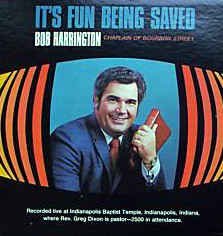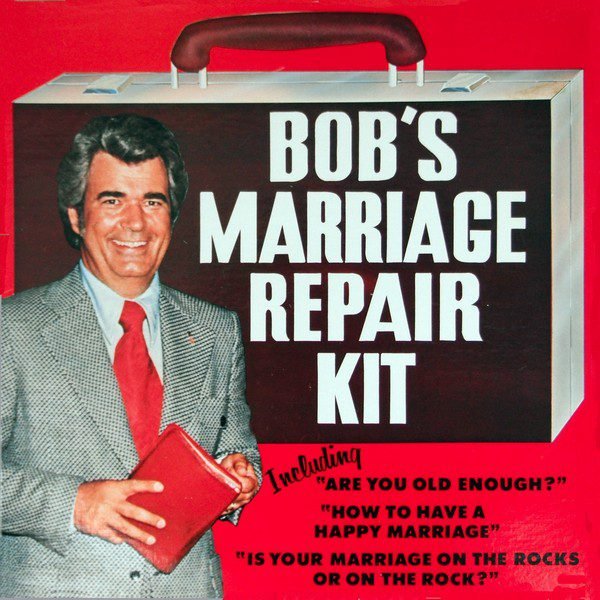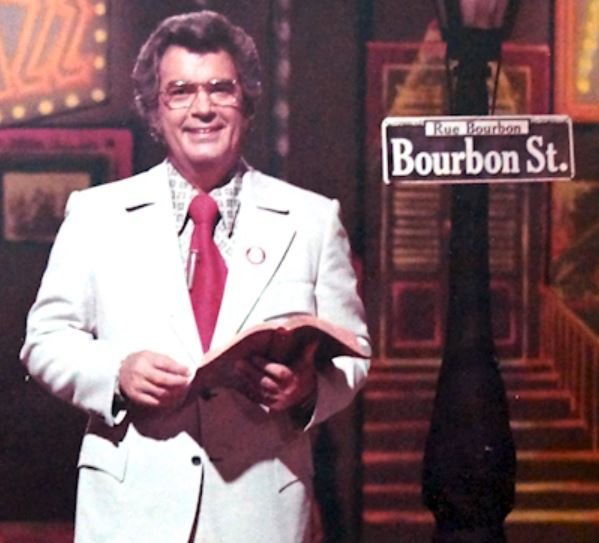
During much of the 1970s, Evangelical crusades were all the rage. As a young teenager, I attended crusades conducted by Billy Graham, Bill Glass, Jack Van Impe (twice), and Bob Harrington. In the early 1970s, Jack Van Impe came to Findlay, Ohio, for a crusade held at Findlay High School. Thousands of people flocked to hear The Walking Bible preach on the soon-return of Jesus Christ. Van Impe even went so far as to predict that the Russian flag would be flying over the U.S. Capitol by 1976. Van Impe was/is what I call a “newspaper preacher.” He looked at the headlines and crafted his sermons to correspond with them. According to the Bible, false prophets are to be stoned to death. If that be the case, Van Impe would have died long before his wife Rexella had her first facial plastic surgery procedure. Van Impe has made countless predictions (prophecies) that have spectacularly failed to materialize. That said, as a recently saved, called-of-God preacher boy, I found Van Impe’s preaching thrilling and motivational, a call to win more souls for Christ before the King of Kings and Lord of Lords returned to earth.
When it came to pure entertainment, however, no evangelist could match the wit, humor, and oratory of the smooth-talking Chaplain of Bourbon Street, Bob Harrington. I was able to locate a quality recording of Harrington on YouTube. The following sermon was preached in 1966 at Landmark Baptist Temple in Cincinnati, Ohio. At the time, Landmark, pastored by Independent Fundamentalist Baptist (IFB) preacher John Rawlings, and was one of the largest churches in the country. Harrington, a Southern Baptist, frequently preached at large IFB churches, including the late Jerry Falwell’s church, Thomas Road Baptist Church in Lynchburg, Virginia.
I owned many of Harrington’s recorded sermon albums. I played them over and over and over again. I loved how he effortlessly mixed humor into sermons. My favorite Harrington quote comes from a sermon of his on the second coming of Jesus. Harrington said, I’m not looking for the undertaker, I’m looking for the upper-taker. I remember telling my youth director, Bruce Turner, at Trinity Baptist Church in Findlay, Ohio, about my fondness for Harrington. Bruce tried to steer me away from Harrington, warning that his kind of preaching wasn’t Biblical and that Harrington was a fad that would soon pass away. If you listened to the recording above, you know that Harrington played loose with the “facts” of his life. For Harrington, preaching was all about telling a good story, even if he exaggerated or fibbed a bit. During college, I remember Tom Malone, the chancellor of Midwestern Baptist College in Pontiac, Michigan, saying during a sermon, “I’m not preaching now, I’m telling the truth.” Malone was joking, but after preaching thousands of sermons and listening to hundreds more, I have concluded that Malone was right; preaching is often an admixture of truth and exaggeration, especially when it comes to sermon illustrations. I remember reading that David Foster Wallace, when questioned about his penchant for exaggeration, said that as long as the basic facts were correct there was no harm in exaggerating a bit to tell a better story. Remember that the next time you hear a preacher use this or that sermon illustration, and if you’re thinking, this story seems to be exaggerated or too good to be true — it probably is. (Another big-name preacher who loved to tell fanciful, exaggerated illustrations was IFB luminary Jack Hyles.)
In the 1960s, Harrington moved to New Orleans to start a street ministry. Armed with a Bible and a microphone, Harrington preached at people as they passed by. According to the Baptist Standard, after several months of street preaching:
deacons at First Baptist Church in New Orleans loaned him enough money for a few months’ rent to open a chapel on Bourbon Street in the heart of the French Quarter. Harrington began witnessing and preaching in the bars and strip clubs of Bourbon Street.
In 1962, Mayor Victor Schiro proclaimed him “The Chaplain of Bourbon Street.”
Harrington’s street ministry message was bold and simple: “God loves you just as you are. He knows you are a sinner and wants to save you. Don’t figure it out. Faith it out!”
In 1968, he held a revival at Castle Hills First Baptist Church in San Antonio. During the revival, the owners of a burlesque club attended an evening service and became Christians. Guy and Evelyn Linton immediately closed the club and posted a sign: “Closed forever. See you in church.”
In the 1960s and 1970s, Harrington was one of the most popular preachers in America. People thronged to his crusades. As a young teenager, I heard Harrington at a crusade in Pontiac, Michigan. I can still remember the excitement that filled the football stadium. Every seat was occupied, and at invitation time, scores of people came forward to be saved. It seemed to me, as a young teenager, that God was pouring out his spirit on Harrington and using him to save thousands of people. In the late 70s, Harrington traveled the country with Madalyn Murray O’Hair, holding meetings that were purportedly a debate between an atheist and a Christian about the existence of God. What it turned into was a much-rehearsed circus sideshow that made a lot of money for both Harrington and O’Hair. Harrington said of the atheist, “Yes, many may say Madalyn knows the Scriptures better than I do, but I know the author.”
Here’s a low-quality video of Harrington’s and O’Hair’s 1970 appearance on the Phil Donahue Show:

Much as my youth pastor predicted, Harrington proved to be a fad. In the late 1970s, Harrington spectacularly crashed and burned, admitting he had committed adultery. He later said, “the devil threw me a pass, and I caught it and ran for defeat.” Harrington would divorce his first and second wives, marrying three times. In a 2000 SBC Life article, Harrington describes his moral failures this way:
Three things got me: fame, finance, and frolic. I was going strong with my little radio program there. Then after the mayor named me Chaplain of Bourbon Street the Governor of Louisiana named me Ambassador of Goodwill to America.
Early on I had trouble paying $500 a week rent for the office on Bourbon Street. But the next thing you know, $500 a week income was changing into $5,000 a week. The “kingdom of thing-dom” started getting more of my attention than the Kingdom of God. I was on nationwide television in four hundred and seventy cities. Everything was going good. Then, Phil Donahue had me on his pilot show. The other guest that day was Madeline O’Hare. That show took Donahue into nationwide syndication. He had us back eighteen times after that. She became a springboard toward my own national recognition, but also a witnessing tool for the Lord. Once people saw the condition of an atheist they wanted to become believers.
I challenged her to meet me in different cities. There were thirty-eight different cities where we would meet in the civic auditorium or the municipal auditorium, and have confrontations on the stage. It became quite popular. We were on Good Morning America, The Today Show, and The Merv Griffin Show.
I had fame, but when you get famous you start thinking, “Look at what I’m doing.” After I got saved, I grew too fast — I didn’t have a good, stable foundation. It’s nobody’s fault but mine, but when you get invitations to come give your testimony, you start adding more dates to it. I had to drop out of seminary because I was preaching two revivals a month. I was so caught up in being an evangelist. Money gets to flowing and you find yourself riding in a big customized bus, you find yourself flying in a Lear jet, and you find your staff members picking up your briefcases. Unless you’ve got a solid base, you can really fall into this. I started believing all my cockiness and all my press releases — and that precedes the fall.
Fame did that. And finance — you get money in your hand, and you’re the president and the treasurer. Signatures are pretty easy to come by. The folks were just giving and giving.
Frolic — after a while you got those Bathsheba’s, [sic] Delilah’s, [sic] and Jezebel’s [sic] out there in the church world – not the Bourbon Street world — that kind of temptation didn’t bother me because I knew they were notoriously wicked. But these were sweet, little ol’ church members. They start telling you how nice and neat you are, and how big and strong you are. Your wife isn’t telling you that any more because she knows what you’re turning into.
All those things — fame, finance, and frolic — led me to catch a pass that Satan threw at the peak of my success. And that pass — I caught that sucker, and ran for defeat. When you break that pass down, P. A. S. S., it’s pride, arrogance, self-centeredness, and stubbornness. That stole my first love away from me, and that’s when I fell.
After his “fall,” Harrington was out of the ministry for seventeen years. He credits Cathedral of Tomorrow pastor Rex Humbard for encouraging him to re-enter the ministry. During his time away from the Lord, Harrington was a salesman and a motivational speaker. Harrington was a once-saved, always-saved Baptist. This meant, regardless of what Harrington did during his time away from Jesus, he was still a born-again Christian.

Harrington describes his return to the ministry this way:
After having served God for many years as Chaplain of Bourbon Street, I began to leave my “First Love” for the Lord. Fame, fortune and frolic got me off the track. I had been on all the major talk shows such as Donahue and Oprah, as well as having my own syndicated TV show across the country. Money got to be no object as the dollars flowed in, and the making of money began to be my focus. I began listening to the young women who bragged on how good I was and looked, and became addicted to their ego boosts. I finally left preaching altogether and went strictly into very successful years as a motivational speaker–finally leaving God completely out of my life. I was miserable; living (existing) on fun and thrills. Little happiness, no joy.
One night while in Los Angeles, CA, I was considering jumping out of a window, when the phone rang and my friend Rex Humbard asked me, “Bro. Bob, aren’t you ready to come back?” I cried, “Yes, I’m so ready!” He then lead [sic] me in reading the 51st Psalm and praying David’s prayer of restoration. Suddenly the burden of guilt was lifted and I knew that God had other plans for my life. These years since then have been a growing and rebuilding time for me, and I’m thrilled to say: “I’m back and It’s Still Fun Being Saved!”
December of 1998 was a particularly wonderful time in my life when God gave to my life a wonderful lady named Becky. We had been acquaintances for nearly 30 years, but when we found each other in August of 1997 after many years, we were both excited as God seemed to draw us together. We were married on December 5, 1998 at the Grand Palace in Branson, MO. Now we headquarter on her miniature horse ranch just south of Ft. Worth, TX, from which we continue to travel across the country doing what God called me to do in 1958…preach the Word.
Harrington died on July 4, 2017. He was eighty-nine years old. He, indeed, had fun being saved.
Did you ever attend a crusade? Please share your thoughts and experiences in the comment section.
Bruce Gerencser, 68, lives in rural Northwest Ohio with his wife of 47 years. He and his wife have six grown children and sixteen grandchildren. Bruce pastored Evangelical churches for twenty-five years in Ohio, Texas, and Michigan. Bruce left the ministry in 2005, and in 2008 he left Christianity. Bruce is now a humanist and an atheist.
Your comments are welcome and appreciated. All first-time comments are moderated. Please read the commenting rules before commenting.
You can email Bruce via the Contact Form.

